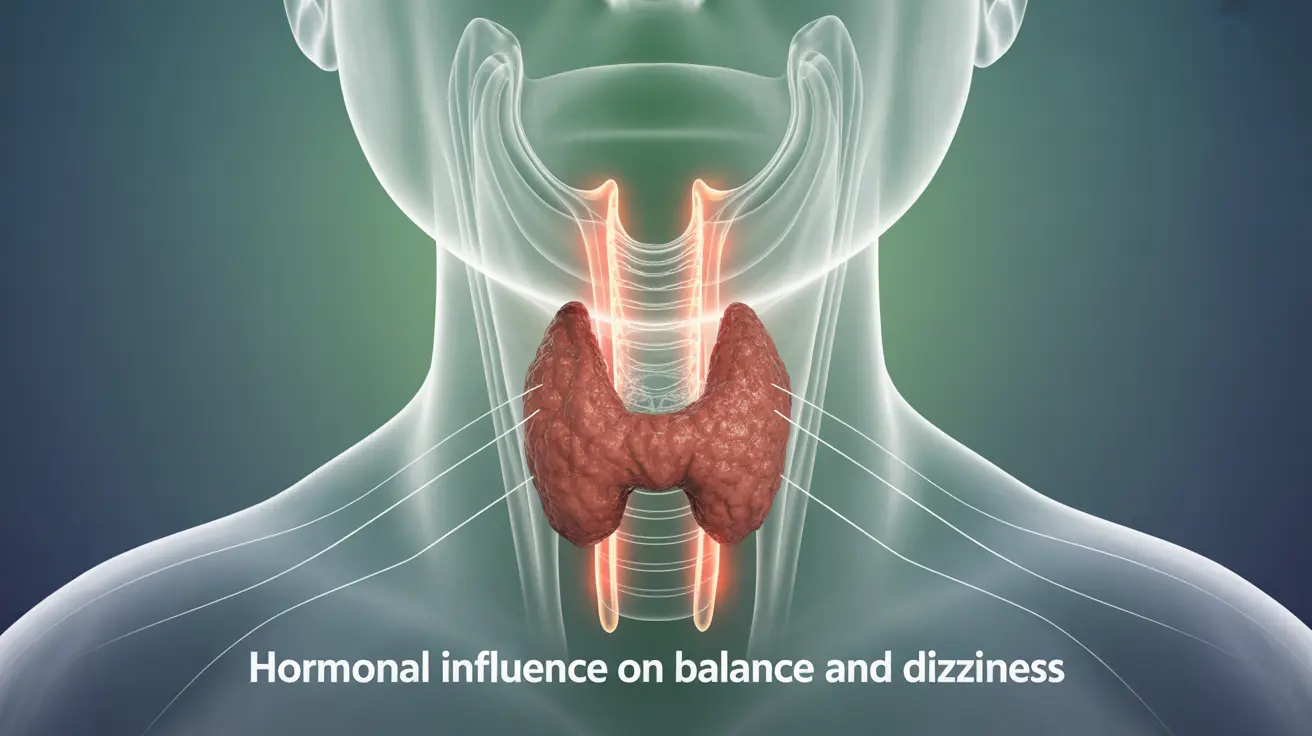If you're experiencing unexplained dizziness, your thyroid function might be a surprising culprit. The thyroid gland plays a crucial role in regulating many bodily functions, and when it's not working properly, it can lead to various symptoms, including dizziness and balance problems.
Understanding what thyroid-related dizziness feels like and recognizing its associated symptoms can help you identify when it's time to seek medical attention. Let's explore the connection between thyroid disorders and dizziness, and learn how to recognize the signs.
How Thyroid Disorders Affect Balance and Cause Dizziness
Thyroid disorders can impact your balance and cause dizziness in several ways. Whether you have an overactive thyroid (hyperthyroidism) or an underactive thyroid (hypothyroidism), the disruption in hormone levels can affect multiple body systems that control balance and spatial orientation.
Hyperthyroidism and Dizziness
When your thyroid produces too much hormone, you may experience:
- Rapid heartbeat or palpitations that can affect blood flow
- Inner ear disturbances affecting balance
- Anxiety and tremors that can contribute to feeling unsteady
- Sudden blood pressure changes causing lightheadedness
Hypothyroidism and Dizziness
With an underactive thyroid, dizziness may occur due to:
- Slower metabolism affecting brain function
- Reduced blood flow and circulation
- Fluid retention affecting inner ear function
- Low blood pressure episodes
Recognizing Thyroid-Related Dizziness Symptoms
Thyroid-related dizziness often has distinct characteristics that set it apart from other types of dizziness. You might experience:
- A spinning or rotating sensation
- Feeling lightheaded or faint
- Unsteadiness when walking
- Difficulty maintaining balance
- Problems with spatial orientation
Additional Warning Signs
Thyroid-related dizziness rarely occurs in isolation. Watch for these accompanying symptoms:
- Unexplained weight changes
- Fatigue or excessive energy
- Hair loss or brittle hair
- Changes in heart rate
- Muscle weakness or tremors
- Temperature sensitivity
When to Seek Medical Attention
Don't ignore persistent dizziness, especially when accompanied by other thyroid symptoms. Contact your healthcare provider if you experience:
- Dizziness lasting more than a few days
- Severe balance problems affecting daily activities
- Additional thyroid disorder symptoms
- Fainting episodes
- Chest pain or irregular heartbeat
Diagnosis and Treatment Options
Your healthcare provider will typically begin with a comprehensive evaluation, including:
- Thyroid function blood tests (TSH, T3, T4)
- Physical examination
- Balance and coordination tests
- Review of medical history and symptoms
Treatment approaches focus on addressing the underlying thyroid condition through:
- Medication to regulate thyroid hormone levels
- Regular monitoring and dose adjustments
- Lifestyle modifications
- Balance therapy if needed
Frequently Asked Questions
What does dizziness caused by thyroid problems feel like? Thyroid-related dizziness typically feels like a combination of spinning sensations, lightheadedness, and unsteadiness. It may worsen with movement and can be accompanied by spatial disorientation and balance difficulties.
How do hypothyroidism and hyperthyroidism cause dizziness and balance issues? Both conditions affect hormone levels that regulate multiple body systems. Hyperthyroidism can cause rapid heartbeat and anxiety-related dizziness, while hypothyroidism may lead to slower metabolism and reduced blood flow, both affecting balance and causing dizziness.
What other symptoms usually accompany thyroid-related dizziness? Common accompanying symptoms include fatigue, weight changes, hair loss, temperature sensitivity, irregular heartbeat, and muscle weakness or tremors. The specific combination depends on whether you have hyper- or hypothyroidism.
When should I see a doctor if I have dizziness and suspect a thyroid disorder? Seek medical attention if dizziness persists for more than a few days, severely impacts your daily activities, or occurs alongside other thyroid symptoms like unexplained weight changes, fatigue, or heart palpitations.
How is dizziness from thyroid problems diagnosed and treated? Diagnosis involves thyroid function blood tests, physical examination, and evaluation of symptoms. Treatment focuses on regulating thyroid hormone levels through medication and may include balance therapy if needed. Regular monitoring ensures optimal treatment effectiveness.




